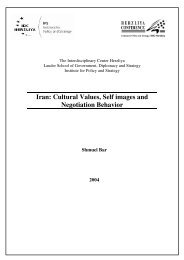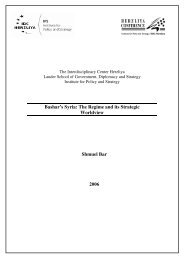Classical Islamic Paradigms of Deterrence and their Expression in ...
Classical Islamic Paradigms of Deterrence and their Expression in ...
Classical Islamic Paradigms of Deterrence and their Expression in ...
You also want an ePaper? Increase the reach of your titles
YUMPU automatically turns print PDFs into web optimized ePapers that Google loves.
SummarySuccessful deterrence must be based on psycho-religious approaches that exploit concepts <strong>of</strong> fear;specifically <strong>in</strong> Sunni-jihadi subculture. Sunni jihadi sub-state actor perceptions <strong>of</strong> deterrence varyconsiderably from those <strong>of</strong> Western secular states. The task is to f<strong>in</strong>d a "common language." Tacticaldeterrence by punishment <strong>and</strong> the actual application <strong>of</strong> force <strong>and</strong> realization <strong>of</strong> threats play a much biggerrole for Muslim sub-state actors <strong>and</strong> are <strong>in</strong>herent elements <strong>of</strong> Sunni-jihadi deterrence; the realization <strong>of</strong>threats, however, plays a much less lesser role for state actors who still th<strong>in</strong>k <strong>in</strong> patters <strong>of</strong> "classical"nuclear-deterrence, where an equilibrium <strong>of</strong> nuclear threat is supposed to guarantee stability. For example,jihadis analogize medieval "s<strong>in</strong>gle attacks" to suicide-attacks, which are meant to frighten the enemy.Initiative deterrence concepts (preterrence; Shmuel Bar) are thus <strong>of</strong>ten analogue to terrorist tactics <strong>and</strong> theasymmetric weaker position <strong>of</strong> sub-state actors. State actors re-act confused <strong>and</strong> unsuccessfullyexperiment with tactical deterrence, try<strong>in</strong>g to beat sub-state actors on <strong>their</strong> own turfs (for example, <strong>in</strong>Waziristan). This policy fails, terrifies <strong>and</strong> terrorizes local populations <strong>and</strong> <strong>in</strong>directly supports jihadi causes.Sunni-jihadi deterrence is characterized by neo-tribal endemic warfare elements <strong>and</strong> terrorist tactics. Thereason is the strong focus <strong>of</strong> jihadis on example cases from early Islam, when Muslims developed fromendemic to imperial warfare. These are taken as conceptual cornerstones by today’s Sunni fighters todevelop patterns <strong>of</strong> deterrence. However, deterrence strategies <strong>and</strong> patterns are not only based onfrighten<strong>in</strong>g the enemy. <strong>Deterrence</strong> is also based on the construction <strong>of</strong> fear <strong>and</strong> fright among friends tojustify aggression aga<strong>in</strong>st foes. In religious sub-culture, transcendental <strong>and</strong> concrete fears can be clearlydiscerned. It is the role <strong>of</strong> reformed deterrence strategists to exploit the fear <strong>in</strong> the m<strong>in</strong>d <strong>of</strong> religious actorsto fail fulfill<strong>in</strong>g God’s comm<strong>and</strong>s. Deal<strong>in</strong>g with religious actors <strong>in</strong> the <strong>in</strong>formation age means to transit fromconventional to alternative deterrence approaches. L<strong>in</strong>guistic <strong>and</strong> psycho-religious approaches are requiredto address <strong>their</strong> fears, while viable non-conflict <strong>and</strong> conciliation policies must address Muslim populations<strong>and</strong> respective meta-cultures.It is very difficult to counter jihadi deterrence by propag<strong>and</strong>a <strong>and</strong> preterrence by terrorist attacks. Yet,possible concepts <strong>of</strong> deterrence <strong>in</strong>clude the build<strong>in</strong>g up <strong>of</strong> "discursive fortifications" <strong>and</strong> "psychologicalwalls," also called "<strong>in</strong>tellectual firewalls." Such walls are needed to block terrorist theological arguments.Similar to physical walls fortify<strong>in</strong>g a medieval city, <strong>in</strong>tellectual walls deny the opponent to securely cross<strong>in</strong>to a place which he aspires to occupy (physical: a city; or psychological: paradise). Deny<strong>in</strong>g possibletranscendental benefits <strong>of</strong> actions, for example rewards <strong>in</strong> paradise, can cause great fears. Intellectualthresholds can then be described as religious-psychological deterrence by denial. Most generally speak<strong>in</strong>g,the feel<strong>in</strong>g <strong>of</strong> "fear" can be divided <strong>in</strong>to two similar, yet very different states <strong>of</strong> consciousness. "Fright"(Lat<strong>in</strong> timor; German Furcht) is focused on a concrete object <strong>and</strong> signifies someth<strong>in</strong>g different from anabstract fear (Lat<strong>in</strong> angor; German Angst).In religious culture, div<strong>in</strong>e comm<strong>and</strong> <strong>and</strong> human piety are strongly based on different threat scenarios thatcause fear <strong>and</strong> explicate prohibitions aga<strong>in</strong>st <strong>in</strong>fr<strong>in</strong>gements. An essential goal <strong>of</strong> deterrence <strong>and</strong>propag<strong>and</strong>a is to address both <strong>in</strong>ternal <strong>and</strong> external fears <strong>of</strong> friend <strong>and</strong> foe. Just as there are different waysto dim<strong>in</strong>ish fear, there are common ways to learn <strong>and</strong> condition fears. The psychological construction <strong>of</strong>deterrence <strong>in</strong> (Sunni-) Islam <strong>and</strong> among its radical sub-sects relies on two factors. Firstly, <strong>in</strong>ternal abstractfear makes followers obey <strong>and</strong> is generally based on "fear from hell-fire" (khauf (m<strong>in</strong> al-nar)) as well as themore specific fear to break obligations to God (bay'at Allah; ittiqa' Allah) – The <strong>Islamic</strong> credo itself is an oath<strong>of</strong> loyalty to Islam, God <strong>and</strong> his messenger Muhammad, which is taken most seriously by devout Muslims.44
















